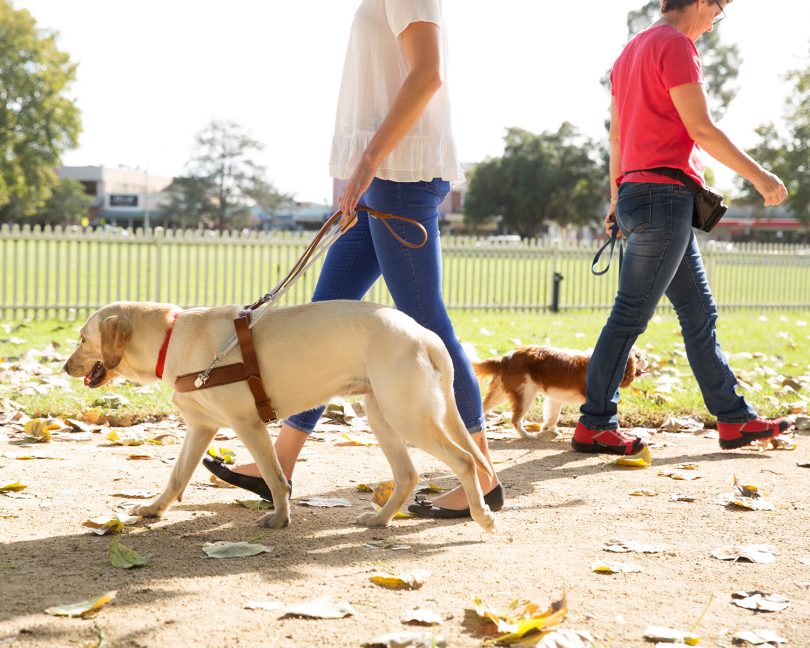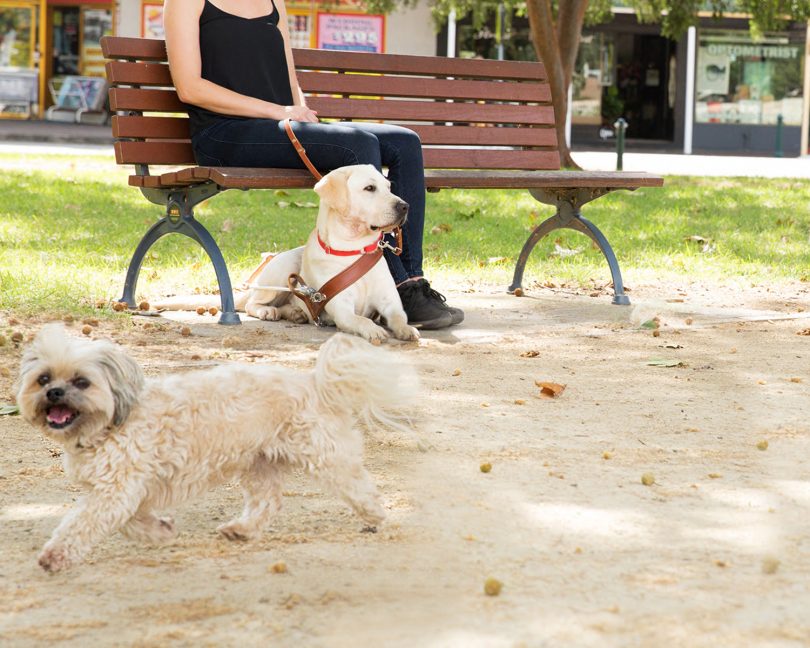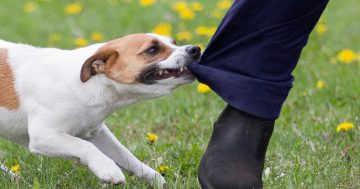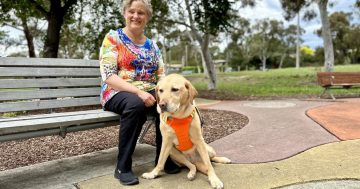
A photo supplied by Guide Dogs NSW/ACT shows a guide dog walking past a pet dog being correctly kept on a lead and under control by its owner.
Dogs off the lead are posing a danger to working guide dogs with one in two handlers in the ACT and NSW reporting that their guide dog was attacked by another dog.
A new client survey by Guide Dogs NSW/ACT found that 78 per cent of these attacks were carried out by off-lead dogs, with dogs on a lead but not controlled by their owner responsible for the other 22 per cent of attacks.
When asked when the most recent attack had occurred, more than half (52 per cent) of those who reported attacks said it occurred within the last year.
One-third (34 per cent) of those who reported an attack said it resulted in injuries to their guide dog, with one guide dog retired as a result of the trauma.
In response to the high number of attacks, Guide Dogs NSW/ACT has launched a new ‘In Your Hands’ campaign designed to raise community awareness about the safety of guide dogs being in the hands of dog owners.
The campaign is encouraging pet owners to keep their dogs on-lead when out in public and to follow simple ‘guide dog etiquette’.
“We want to raise awareness of the danger off-lead pet dogs pose to working guide dogs and their handlers, and educate the community about the importance of keeping pet dogs on leads and under control when in public areas and particularly when around guide dogs,” said Dale Cleaver, CEO of Guide Dogs NSW/ACT.

A photo supplied by Guide Dogs NSW/ACT showing what not to do – with the pet dog not on a lead.
Dave and Corrie’s tale of attacks
Queanbeyan-based guide dog handler, Dave Brown knows all too well the danger off-lead dogs can pose to the safety of his guide dog Corrie.
“I’ve only had Corrie, my first guide dog, for less than a year and we’ve already experienced lots of distractions from other pet dogs and even a few attacks,” Mr Brown said.
“The worst situation was when a pet dog launched at Corrie and shoved himself between us so suddenly that I had to let go of Corrie’s harness.
“Even if a dog doesn’t directly attack your guide dog, the distraction enough can be dangerous for the handler,” he said.
“Worst-case scenario I could be pushed onto a road and in front of a bus, but more often than not it just disrupts my day and affects my guide dog’s training.
“If Corrie gets distracted by a pet dog, sometimes I have to spend a week working with him to reinforce his training.
“My main piece of advice to dog owners would be to keep your dog on lead and under control when out in public, and if you see a guide dog and their handler, give them space and try to not let your dog interact with them.”
Everyday distractions from other dogs causing anxiety
Aside from attacks, the survey also revealed working guide dogs experience high levels of everyday distractions from other dogs, causing their handler who is blind or vision impaired to experience anxiety and a loss of confidence, as well as compromising their safety and independence.
Once again, dogs not on leads are the major problem, with 80 per cent of guide dog handlers surveyed saying off-lead dogs had distracted their guide dogs while working. Other distractions guide dog handlers reported include:
- unaccompanied dogs tied up outside shops and cafes;
- a person with a dog approaching a guide dog team without making themselves known;
- dogs on-lead not being controlled by their owners;
- barking dogs behind fences;
- dogs tied up on parked utes in rural areas.
One-third of the guide dog handlers surveyed said they now avoid certain locations known for dog-related problems.
“It’s really worrying that so many guide dogs are still being attacked or distracted by off-lead pet dogs, especially when this is a recurrent topic amongst our community awareness campaigns,” Mr Cleaver said.
“Guide dogs play a vital role in enabling people who are blind or vision impaired to move around their community independently.
“Attacks and distractions compromise this independence and can cause serious injury and trauma to both the handler and the guide dog.
“In rare serious cases, attacks can result in premature retirement of a guide dog, which costs more than $35,000 to train,” Mr Cleaver said.
“We’re reminding dog owners across NSW and the ACT that the safety of guide dogs and handlers is very much in your hands. By keeping control of your own dog, you can help create a safe community, not just for guide dogs and their handlers, but for everyone.”
Dos and Don’ts
The ‘dos and don’ts’ of the campaign include:
- keep your pet dog on a leash and under control when out and about
- if you see a loose dog, please alert your local council
- if you see a working guide dog in harness, please give it and its handler space
- don’t pat, feed or otherwise distract a working guide dog. A well-intentioned pat can undo months of training.
Click here for more information about the campaign.
Are you alarmed that so many guide dogs are being attacked by other dogs? Do you think too many dog owners are being careless when it comes to keeping their dogs on leads? Let us know in the comments below.














